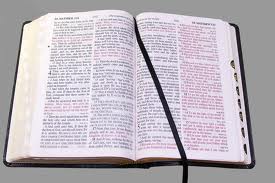Do you have a plan for 2015?


The first congregation of Dr. D. Martyn Lloyd-Jones was in a Welsh town called Sandfields. In his biography of Lloyd-Jones, Iain Murray relates how the pastor made efforts to get his congregation into the Word of God on a daily basis. It was his conviction that every pastor should go through the complete Bible in one year — “That should be the very minimum of the preacher’s Bible reading.” But he also believed that such a discipline of Bible reading would be beneficial for all church members. Initially, the Doctor developed his own Bible-reading plan which would take the congregation through the entire Bible in one year. However, eventually he discovered the reading plan developed by Robert Murray M’Cheyne and, for the rest of his life, this was the plan he used personally and that he recommended to parishioners.
Thanks to one of my elders, I have become convinced that every Christian should have a plan for disciplined regular reading of the Scriptures. I have been practicing it now for three years and the blessings have been enormous. For 2015, I plan to continue this practice using the reading plan recommended by Dr. Martyn Lloyd-Jones and used with great profit by many. You can find Robert Murray M’Cheyne’s original plan online here. (Over here is a better format for printing). The original plan includes some helpful notes from M’Cheyne about the practice of daily Bible reading, including the dangers and advantages. M’Cheyne’s plan knits together family Bible reading and individual Bible reading and you could do it that way. I’m going to be taking a different approach — I’ll be using the family Bible reading in the morning and the individual Bible reading in the evening. With M’Cheyne’s plan, in the span of a year you go through the entire Old Testament once and the New Testament and Psalms twice.
Every year this topic gets raised on blogs and social media. Every year the objections get trotted out. My answer: why not just try it? It doesn’t have to be M’Cheyne’s plan, it could be any one of a variety of plans (see here for some links). It could be a one-year, a two-year, or even a three-year plan. But if the Word of God is precious to us, and if we believe that reading it will enrich our faith, then shouldn’t we have some type of plan in place to help us stay on track? And what if you do fall behind? Sometimes events conspire against the best made plans for Bible reading. If you haven’t fallen too far behind, do some catch up on the Lord’s Day — that’s a great time for some extra Bible reading. If you’ve fallen really far behind, just carry on with the plan and don’t stress about it.
If you don’t already, let me encourage you to take up this practice as of January 1, 2015 — it will not always be easy, but ultimately you will not regret it!


